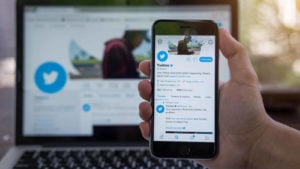Twitter Stock Is Caught Between a Rock and a Hard Place
Trump's attack on social media raises important questions over business models and politics
President Donald Trump has gone to war with Twitter (NYSE:TWTR) and the market is buying popcorn. Twitter stock is down more than 3% on Friday on the news.

Amid great fanfare, Trump signed an executive order May 28 aimed at limiting the broad legal protections granted to social media.
Those so-called Section 230 protections, part of the 1996 Communications Decency Act, mean that internet companies can’t be held liable for their users’ actions.
Trump was moved by fact checks Twitter placed on two of his tweets, concerning mail-in voting and the death of a congressional aide 20 years ago. It’s part of a broader attack against what Republicans call Big Tech — the cloud giants, and companies using them to communicate.
What does this all mean for Twitter stock?
Rock, Meet Hard Place
Trump has 80.5 million Twitter followers. He often uses the service in lieu of a press office.
Until recently his tweets were left alone, despite constant complaints about their veracity. That seemed to climax when TV host Mika Brzezinski personally asked Twitter CEO Jack Dorsey to close Trump’s account. He chose not to do so, insisting Twitter is not an “arbiter of truth.”
But Twitter did take other actions, labeling one tweet as “glorifying violence” with a warning and issuing the “fact checks.”
Beyond Trump, Twitter has suffered from uneven growth. Its most recent earnings beat estimates. But revenues were down from the previous three quarters. The company has added Stanford professor Fei-Fei Li, an artificial intelligence expert and former Alphabet (NASDAQ:GOOG, NASDAQ:GOOGL) executive, to its board. The company appears to have reached the limits of its business model, user-generated content backed by advertising.
Facebook Is a Bigger Loser
The big loser here might be Facebook (NASDAQ:FB).
CEO Mark Zuckerberg has tried to stay above the fray, arguing that private companies shouldn’t be “arbiters of truth.” This has gotten him into trouble with liberals who say he’s profiting from the destruction of democracy.
Facebook is also more than 20 times bigger than Twitter by market capitalization. While its shares fell just 1.6% on May 28, that represented nearly $10 billion of market cap. Twitter is worth $24 billion.
Facebook faces pressure from countries around the world, where the First Amendment is only a local ordinance. It still doesn’t serve China, despite repeated attempts. Facebook is also one of the five giants that owns its own cloud infrastructure.
Facebook is the smallest of the five, the one most dependent on advertising for its revenue. It is building undersea cables around Africa and has a stake in an Indian mobile company.
Twitter’s controversies have Facebook between a rock and a hard place. Its position is that it’s a global phone company, allowing communication but exerting no control over it. But it has taken steps to police itself, like shutting down misinformation about the novel coronavirus and targeting accounts that exist to spread conspiracy theories.
The Bottom Line on Twitter Stock
Right now, everything is political.
There is no way either Twitter or Facebook can allow comment on the burning issues of our time and not come under attack.
Both companies have had to take responsibility for the media they created. But those who benefitted from their refusal to do that until now won’t let go easily.
The result is that costs are rising while revenue for Twitter is plateauing. Revenue may even decline in future quarters, due to a global recession caused by the coronavirus. If you want to be in business with Jack Dorsey, it’s more hip to buy Square (NYSE:SQ).
Dana Blankenhorn has been a financial and technology journalist since 1978. His latest book is Technology’s Big Bang: Yesterday, Today and Tomorrow with Moore’s Law, essays on technology available at the Amazon Kindle store. Follow him on Twitter at @danablankenhorn. As of this writing he owned shares in FB.